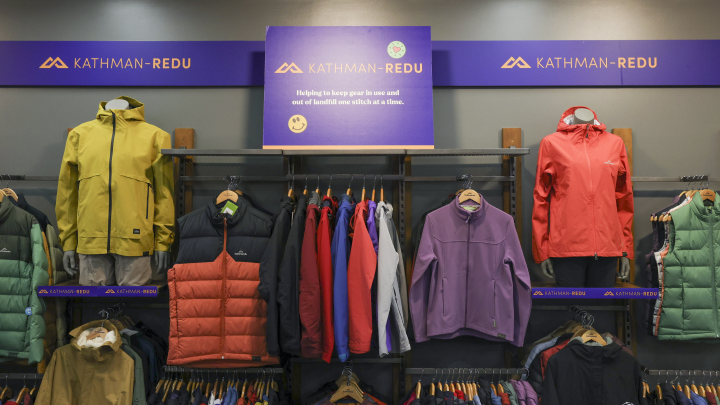New Zealand outdoor clothing brand Kathmandu has launched a new circular initiative, Kathman-Redu, which aims to give new life to damaged stock, as well as recycle unsellable goods in a more meaningful way. The business has long facilitated repairs for customers with damaged products, but it recently partnered with two Australian organisations – Remote Repairs and textile recycling service Upparel – to reduce its textile waste by repairing, recycling and, where possible, reselling refurbishe
shed Kathmandu goods within its store network.
For now, the program is only available in Victoria, but following a pilot period, the business expects to be able to roll it out across the rest of Australia.
Kathmandu’s head of environmental, social, and governance (ESG) Shasta O’Loughlin told Inside Retail the business has gone to great lengths to determine whether such a program would be successful, and believes that the customer demand is there.
“We’ve done assessments across the whole business to identify the areas where products are unsellable, and we’re looking at those streams to identify how we can reinvest back into the product to see if we can make it into something that customers want,” O’Loughlin said.
Some examples of ‘unsellable’ products, according to O’Loughlin, would be production and development samples, as well as items damaged in stores or during transit. For instance, if a staff member accidentally slices them while opening a box.
Additionally, customers will be able to donate used Kathmandu stock that is damaged, and the business will determine if any repairs can be made to extend its life. If nothing can be done, the goods will go to Upparel for recycling.
“If we can intercept a product and say, ‘Actually, that’s still got some life left in it,’ and a customer is happy to [donate it], we’ll pay for the repair and wash and pop it back on the floor to resell it to someone,” O’Loughlin said.
Any product that has been repaired in this way will be marked as part of the Kathman-Redu project, to avoid any confusion for customers. The pilot will run until October, and is aiming to recirculate 5000 products in that time.
Teamwork makes the dream work
Besides Upparel and Remote Repair, Kathmandu also received funding from the Victorian State Government, and external consultation from industry experts Aleasha McCallion and Kirri-Mae Sampson, to bring the Redu project to life.
To O’Loughlin, having a number of external partners on such a project not only makes it easier to complete, but also provides a level of accountability that can be difficult to achieve in a wholly internal project.
“Having an external partner that comes in and can give an unbiased opinion on a process, and say that it can be successful, just gives us that external lens,” O’Loughlin said.
“[Aleasha and Kirri-Mae] played a really key part in doing some of the mapping out and analysing our product range and the financials. They produced a report that said the project could be viable, which made the business realise that, yes, we should be doing this.”
Back to the old ways
Redu is the latest example of Kathmandu’s long-running efforts to adopt more sustainable practices. The business has been working with Remote Repairs to offer customers in Victoria a repair service for some time, but expanded the partnership for this venture.
Nevertheless, O’Loughlin believes the Redu project will force the business to rethink its operations in a broader way.
“It’s very easy for retailers to set themselves up to get product out of the door, but they’re not set up to get that product back,” O’Loughlin said.
“It does challenge some of our process, but [sustainability is] something that we’re definitely committed to.”
O’Loughlin pointed to Rip Curl recently joining the Australian Fashion Council’s Seamless scheme as another way the business is shoring up its sustainability efforts, and noted that collaboration between industry players is the best way to make meaningful change across the fashion space.
“We know that we have a responsibility. We’re not fast fashion, and we create long-lasting, durable products, but we want to better understand the impact we can have on the wider industry and collaborate,” she said.
“Redu is definitely costing us money to implement, but what the pilot is allowing us to do is to really assess what it will look like, what it will cost, what the impact will be, and if the customer wants it.”
That last point is important, O’Loughlin said, as it has become normal for customers to view their garments as expendable. Most people don’t go to the effort of repairing or maintaining their clothing – instead, they replace it with a new product and throw out the old.
But she is excited to see growing interest in repairing, sewing, and patching up holes.
“I think we’re actually doing a bit of a 180, and are getting back to what the industry used to be like. I remember having patches on my jeans as a kid, because that’s just what you did. Your parents or your grandparents used to repair things,” O’Loughlin said.

